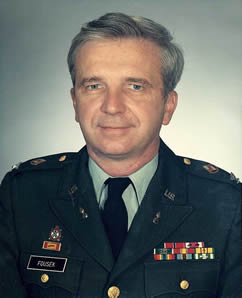Colonel
Richard J. Fousek
 Colonel Richard J. Fousek was born August 27, 1944 in Baltimore, Maryland. He graduated from Loyola College and received a commission in the Ordnance Branch in 1966.
Colonel Richard J. Fousek was born August 27, 1944 in Baltimore, Maryland. He graduated from Loyola College and received a commission in the Ordnance Branch in 1966.
He spent the early years of his career in positions of ever-increasing responsibility in company-level assignments that took him to Germany and combat in Vietnam. Following instructor duty at Aberdeen Proving Ground, Fousek gained experience as a staff officer at Tank-Automotive Command in Warren, MI., working in the program office of the M561 1-1/4 ton truck and the M60A2 family of tanks. After an assignment as the Materiel Officer for the 123rd Maintenance Battalion, 1st Armored Division, Fousek assumed the responsibilities of Inspector General at the Armament and Readiness Command, Rock Island, IL and worked on ammunition safety.
In 1983, Fousek assumed Command of the 724th Maintenance Battalion, 24th Infantry Division at Ft. Stewart, GA. He took command of the battalion at a time of transition and force modernization. He reorganized his Battalion into a new structure known as the multi-functional Main Support Battalion. Under his leadership, the 724th Maintenance Battalion was reorganized into the 4th Main Support Battalion and pioneered multi-functional logistics support to the Division.
Following Command, he served as the Deputy Chief of Staff, G-4 for the 24th Infantry Division. During this time, he was responsible for fielding the Army’s new equipment and systems; to include the fielding of the M1A1 Main Battle Tank; fielding of the Unit Level Logistics System (ULLS); and introduction of the Standard Army Retail Supply System (SARSS).
In 1988, Fousek became the Program Manager for Light Tactical Vehicles including the High Mobility Multipurpose Wheeled Vehicle (HMMWV). He was responsible for procuring over 48,000 of these trucks for the Army. Following this assignment, he served as the Deputy Program Executive Officer for combat support vehicles. In this capacity, he was the primary coordinator with the Department of the Army in procuring the program funding for the heavy equipment transporter (HET) and the palletized loading system (PLS).
In 1990, Fousek took command of the Division Support Command of the 1st Cavalry Division and deployed 3,200 Soldiers to Saudi Arabia in support of Operation Desert Shield and Operation Desert Storm. While deployed, his unit maintained exceptional readiness ratings and orchestrated the 1st Cavalry Division’s tank exchange prior to crossing the line of departure. Upon his return, he was responsible for the Divisions’ full re-constitution and preparation for follow-on missions.
Following command, Colonel Fousek assumed responsibilities as the III Corps G-4. He introduced III Corps to the single stock fund concept and served as the architect for the modernization of both the Abrams tank fleet and the entire tactical truck fleet. He culminated his assignment with III Corps by deploying to Kuwait and serving as the Chief of Staff (Forward). In this capacity, he downsized and transitioned Corps’ tactical operations center into a more streamlined and efficient operation. His greatest contribution in this assignment came with the responsibility for relocating the 5th Infantry Division from Fort Polk, Louisiana, to Fort Hood, Texas. His keen sense of detail enabled the movement of 9,000 Soldiers and their families.
In 1995, Fousek became the Director for Customer Support at the Defense Industrial Supply Center in Philadelphia, PA. He directed materiel management at this multi-service national inventory control point. He implemented both direct delivery and corporate contracting concepts during his tenure. These programs greatly enhanced war fighter capability by speeding up the procurement process and significantly reducing the wait time for high priority repair parts. Also, he implemented the development of Regional Joint Customer Service teams for synchronized joint service support.
Colonel Richard J. Fousek retired from active duty on October 1, 1996.